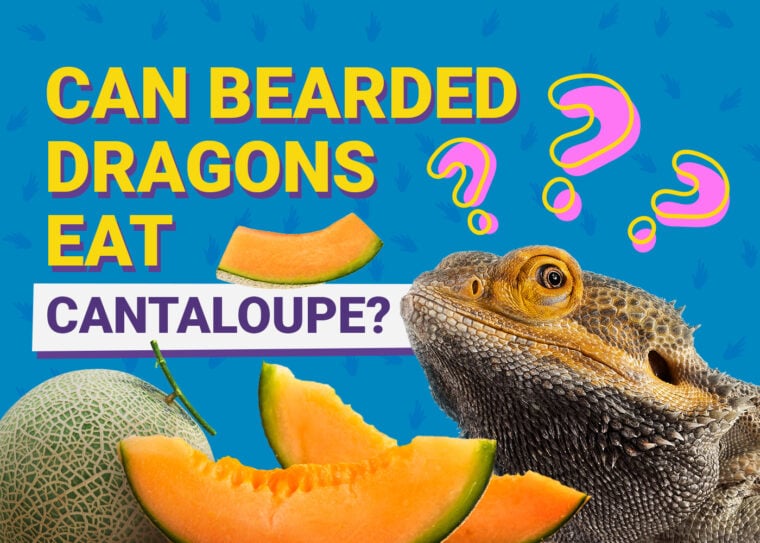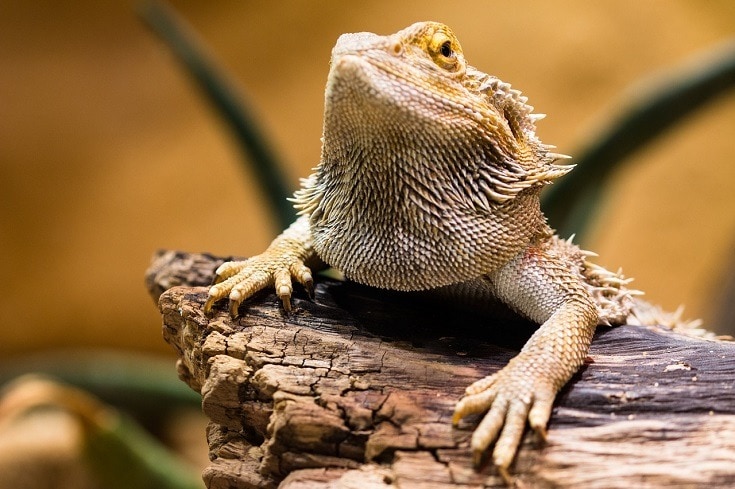
Many reptiles strictly eat insects, rodents, or other prey species. The bearded dragon differs because they are an omnivore that also enjoys plants, vegetables, and even fruits. You may wonder if you can give your pet cantaloupe.
The answer is a qualified yes.
Let’s run down the facts that you need to know about supplementing your bearded dragon’s diet with this tasty fruit.

What Bearded Dragons Eat in the Wild
Bearded dragons are opportunistic eaters, a typical characteristic of many omnivores. The bulk of their diet in their native Australia consists of vegetation, such as flowers, leaves, and sometimes fruits.
In addition, wild bearded dragons will eat meat in the form of smaller reptiles and even rodents. They will also feed on insects.
The bearded dragons that you find in pet stores are bred under human care and not wild reptiles. After decades of breeding, they have adapted to eating other foods. Options include mealworms, crickets, and commercial diets.
Nutritional Value of Cantaloupe
Many human foods are toxic to pets, such as chocolate. Fortunately, cantaloupe is safe for bearded dragons to consume1.
Cantaloupe also contains vitamin C, however, unlike humans this particular vitamin isn’t considered essential for a bearded dragon because they can make it themselves.

Risks Associated With Cantaloupe Consumption
Despite their many benefits, cantaloupes should be viewed as an occasional treat for your bearded dragon and not a dietary part of their diet.
The main reason that a cantaloupe isn’t recommended as a dietary staple in a bearded dragon’s diet is its calcium-to-phosphorus ratio. For healthy adult bearded dragons in maintenance, their diet should have a calcium-to-phosphorus ratio of anywhere between 1.5:1 and 2:1. This means the calcium should be around twice as much as the phosphorus. The recommended ratio for juveniles is around 2:1, and dragons that are breeding (particularly females) require a much higher calcium intake compared to adults in maintenance.
In cantaloupes, the calcium is much lower than the phosphorus, typically around 1:1.6. Such a ratio is undesirable for the long-term health of a bearded dragon. Phosphorus balance in the body requires that it be in the correct proportion with calcium. It binds to calcium, so when a bearded dragon is fed high amounts of phosphorus, their body responds by pulling calcium out from the bones to restore the proper levels of minerals and reduce the excess phosphorus in the bloodstream. Over time, the loss of calcium from bone mass can make the bones brittle and weak, leading to a condition called metabolic bone disease.
You may also see changes in your pet’s behavior. They may hide more or walk strangely because of the pressure of the swelling. Correcting the animal’s diet is the best recourse. Otherwise, the disease can become life-threatening if left untreated.
In addition, an inappropriate ratio of calcium to phosphorus is undesirable for the long-term health of a bearded dragon because it may predispose them to kidney or parathyroid issues. Therefore, cantaloupes (like many other fruits) should be viewed as treats and not significant components of their daily salad servings.
Digestive issues may be observed if you feed too many cantaloupes to your bearded dragon. The high water content of most fruits means that consuming large numbers of them in a short span of time can lead to digestive distress that often manifests as episodes of diarrhea.
Cantaloupes contain a moderate amount of sugar (in the form of carbohydrates). In bearded dragons, excess sugar is not directly associated with diabetes and the exact mechanism of diabetes in bearded dragons is still not properly understood. However, an overabundance of calories can lead to an obese pet, which isn’t healthy and may serve as a precursor for other diseases. The sugar in fruits may also be a contributing factor to dental disease in bearded dragons.
The proper balance of nutrition for an omnivorous reptile is:
Please note that an adult bearded dragon has a diet that is somewhat biased towards an herbivorous reptile. It is best to discuss your bearded dragon’s diet with your veterinarian.


Conclusion
It’s clear that cantaloupe shouldn’t be an everyday food for your pet lizard. Fruits like strawberries and others are fine with two caveats. First, they must not make up more than 5% of your bearded dragon’s diet. Greens and insects should make up most of what they eat. Second, you must cut the fruit into small pieces to make them easier to swallow.
If you follow these guidelines, you can offer your bearded dragon an occasional treat of ripe, raw cantaloupe.
Featured Image Credit: pasja1000, Pixabay









